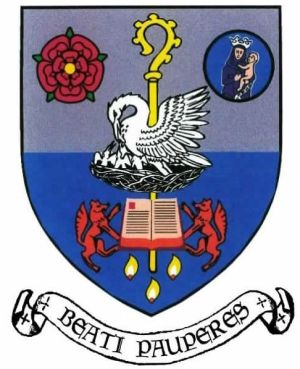Patrick O'Donoghue: Difference between revisions
Knorrepoes (talk | contribs) (Created page with "{{religion}} ''' {{uc:{{PAGENAME}}}} ''' Born : 4 May 1934<br> Deceased : Bishop of Lancaster, 2001-2009 File:Lancaster-odonoghue.png|center|30...") |
Knorrepoes (talk | contribs) No edit summary |
||
| Line 8: | Line 8: | ||
Bishop of [[Diocese of Lancaster|Lancaster]], 2001-2009 | Bishop of [[Diocese of Lancaster|Lancaster]], 2001-2009 | ||
[[File:Lancaster-odonoghue. | [[File:Lancaster-odonoghue.jpg|center|300 px|Arms of {{PAGENAME}}]] | ||
===Official blazon=== | ===Official blazon=== | ||
===Origin/meaning=== | ===Origin/meaning=== | ||
The episcopal crozier indicates his commission from Christ through the Apostles to be a good pastor, a shepherd (John 21:15-17). The pattern of Bishop O’Donoghue’s crozier in the present arms is taken from an ancient carved ivory version in elaborate Celtic design and dating from the time when the O’Donoghue clan were prominent in medieval Ireland. | |||
The branch of the clan known as O’Donoghue ‘of the Glen’ bore arms which included the motif of the ‘pelican in her piety’. According to the medieval literary source known as the Bestiary, the pelican, in her love for her young, willingly bled herself to death in shedding her life’s blood from her breast to feed her young. Thus the pelican became a powerful symbol of Christ’s redeeming work on the cross and of the eucharist, the Church’s banquet (1 Corinthians 10:16-17). | |||
Blood-red is the colour of the rose of [[Lancashire]] which is displayed in the bishop’s arms because his diocese covers so much of the ancient county and his cathedral is sited in the historic county town of [[Lancaster]]. | |||
Extending from the Ribble at Preston to the Eden at Carlisle and the Scottish Border, Bishop O’Donoghue’s vast diocese takes in the counties of Cumberland and Westmorland, brought together in 1974 as the county of Cumbria. Within that country’s present borders lie the lovely ruins of the Cistercians’ Furness Abbey on the outskirts of Barrow-in-Furness. Founded in the twelfth century , Furness Abbey bore on its seal the beloved image of Our Lady of Furness, shown now in the arms of the bishop. | |||
The arms also incorporate the Book of the Gospels, supported by foxes taken from the original O’Donoghue coat of arms. The three flames are symbolic both of the Blessed Trinity and the fire of Pentecost.... “they were all filled with the Holy Spirit.” (Acts 2:1-11). | |||
{{media}} | {{media}} | ||
[[Literature]] : | [[Literature]] : http://www.cathedral.plus.com/Bishop%20O'Donoghue.html | ||
[[Category:Roman Catholic bishops|O'Donoghue]] | [[Category:Roman Catholic bishops|O'Donoghue]] | ||
Revision as of 05:45, 27 June 2020
Religious or Ecclesiastical heraldry portal
This page is part of the Ecclesiastical heraldry portal |
Heraldry of the World |
|
Catholic heraldry
|
Other Christian churches Other religions
|
PATRICK O'DONOGHUE
Born : 4 May 1934
Deceased :
Bishop of Lancaster, 2001-2009
Official blazon
Origin/meaning
The episcopal crozier indicates his commission from Christ through the Apostles to be a good pastor, a shepherd (John 21:15-17). The pattern of Bishop O’Donoghue’s crozier in the present arms is taken from an ancient carved ivory version in elaborate Celtic design and dating from the time when the O’Donoghue clan were prominent in medieval Ireland.
The branch of the clan known as O’Donoghue ‘of the Glen’ bore arms which included the motif of the ‘pelican in her piety’. According to the medieval literary source known as the Bestiary, the pelican, in her love for her young, willingly bled herself to death in shedding her life’s blood from her breast to feed her young. Thus the pelican became a powerful symbol of Christ’s redeeming work on the cross and of the eucharist, the Church’s banquet (1 Corinthians 10:16-17).
Blood-red is the colour of the rose of Lancashire which is displayed in the bishop’s arms because his diocese covers so much of the ancient county and his cathedral is sited in the historic county town of Lancaster.
Extending from the Ribble at Preston to the Eden at Carlisle and the Scottish Border, Bishop O’Donoghue’s vast diocese takes in the counties of Cumberland and Westmorland, brought together in 1974 as the county of Cumbria. Within that country’s present borders lie the lovely ruins of the Cistercians’ Furness Abbey on the outskirts of Barrow-in-Furness. Founded in the twelfth century , Furness Abbey bore on its seal the beloved image of Our Lady of Furness, shown now in the arms of the bishop.
The arms also incorporate the Book of the Gospels, supported by foxes taken from the original O’Donoghue coat of arms. The three flames are symbolic both of the Blessed Trinity and the fire of Pentecost.... “they were all filled with the Holy Spirit.” (Acts 2:1-11).
Contact and Support
Partners:
Your logo here ?
Contact us
© since 1995, Heraldry of the World, Ralf Hartemink 
Index of the site
Literature : http://www.cathedral.plus.com/Bishop%20O'Donoghue.html












